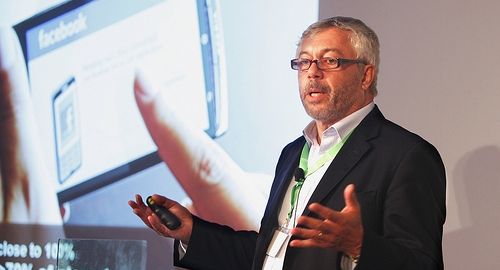They even tried to ban it. Today EMI, Sony Music, Warner Music, and Universal music called the Majors, have allowed Apple to lead the market. Game over. More importantly, it will happen in all publishing activities: book publishing, newspapers and magazines, Radio, TV channels, Films.
The web, the cloud and all its applications and the new mobile devices are profoundly changing the way we work, the way we learn, the way we create new services and the way opinions are formed. The world is shifting from a very top‐down to a bottom‐up and collaborative approach. A wiki‐world?
Now, let’s have a quick look at the third issue: the “9 billion survivors challenge”. This is a tough one, the “Inconvenient truth”, the climate change challenge. Imagine you are between 20 and 25 years old today, you are our clients and the consumers of tomorrow ‐ and the young talent of today. Unlike my generation, you take it for granted that the resources of the planet are finite. That life and the planet are in danger and have to be protected, that life in cities, where 75% of the world population will live in 25 years time, has to change radically. What I call the 4G, the Google, Green and Generous Generation has pushed the sustainability agenda that is making oil companies, car companies, train companies, even beauty product or food companies change not only their communication but have also pushed companies to re‐think the way they use natural resources.
We have to re‐invent a way of life that will allow 9 billion people to live in harmony on earth by 2030. i.e, tomorrow.
So what does all this mean for our PR industry? Let’s look again at the 3 billion new traders challenge.
- The world is becoming more and more complex. Well complexity is good for PR and strategic communication consultants: if we succeed in being our clients most trusted advisors, then the future is bright. CEOs are more and more isolated. They can’t always share their thoughts and concerns internally or externally. Communication consultants are here to help them with their company’s reputation, image and the CEO’s image itself.
- The turnover rate at the top is becoming really worrying: Leo Apotheker stayed less than a year at the helm of HP, Oswald Grübel , not even two years at UBS, just to take two examples of very recent moves. I am sure that you can think of many more. CMOs tenure is, on average, less than two years. This means that we have to establish strong relationships with our clients at several levels, at Board level, at CMO or CCO and Brand managers level. If we rely only on one client, changes will threaten our client relationship.
- Insights and real trends: CEOs need people from outside that can help them to separate the mundane from the critical, the froth from real trends that are reshaping their industry (For instance the Cloud is threatening the business model of software publishers like Microsoft, Oracle and SAP; new mobile devices and tablets are threatening established PC manufacturers).
We need to raise our game, to produce insights and ideas that will make our clients shine. We want our clients to be thought‐leaders in their respective field, to anticipate significant shifts. I know it is easier said than done, but it is where our future lies. Quality research, analysis and strategic thinking are more important than they have ever been.













